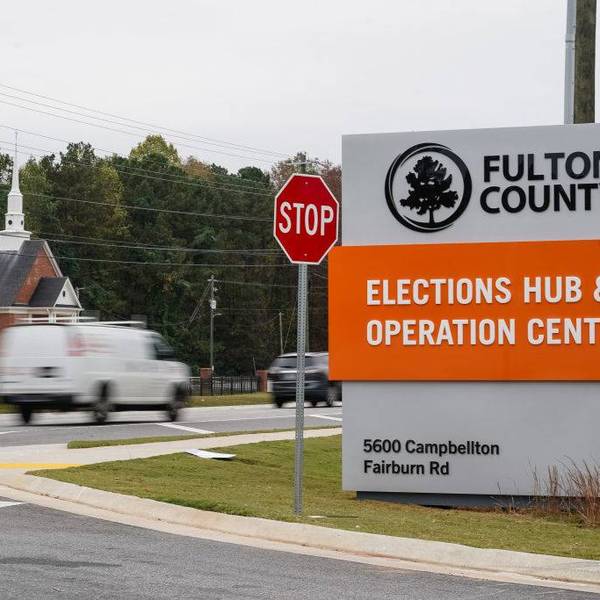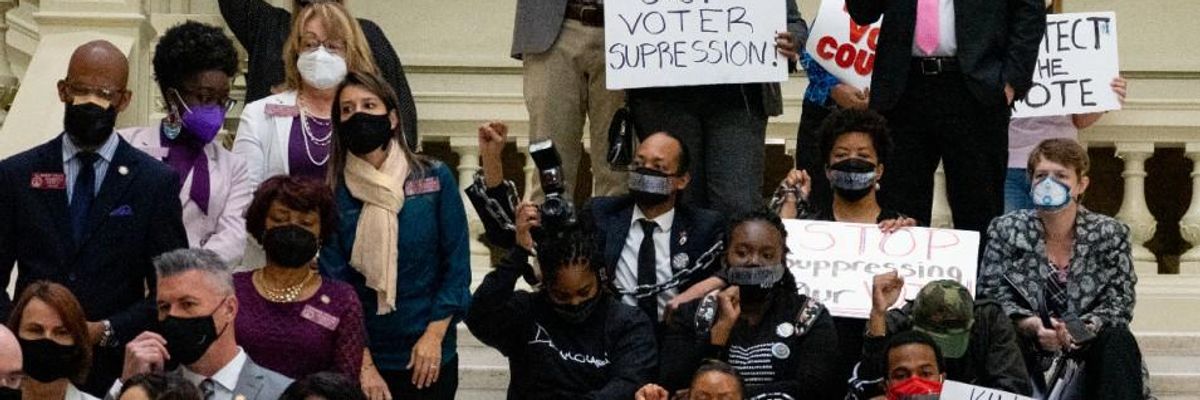Something's rotten in Georgia, and it's not the peaches: Gov. Brian Kemp just signed into law a regressive omnibus bill containing a number of provisions that will make voting harder. This is the law that infamously makes it a crime to provide food or drink to anyone waiting in line to vote--and Black voters will likely suffer disproportionately because poll closures in predominantly Black communities have led to hours-long lines. In response, voting rights activists--such as members of the New Georgia Project and other groups-- have been calling out corporations that made political contributions to the Republican lawmakers.
Coca-Cola also made political contributions to the very politicians who wrote, passed, and signed this bill into law.
Coca-Cola, for instance, has been the target of plenty of backlash from voting advocates, in part because it's one of the biggest companies based in Georgia. But Coca-Cola also made political contributions to the very politicians who wrote, passed, and signed this bill into law. For example, according to Follow the Money, Coca-Cola gave to Brian Kemp's gubernatorial campaign in 2018. Other corporate donors to Governor Kemp included SunTrust Bank, Philip Morris USA, Koch Industries, Blue Cross Blue Shield of Georgia, Home Depot, Delta Airlines, and Pfizer.
Republican State Rep. Barry Fleming, who authored some of the Georgia legislation, also received corporate donations from companies including United Health Group, Coca-Cola, Philip Morris USA, Comcast, Walmart, Allstate Insurance, AT&T, Publix, SunTrust Bank, Georgia-Pacific, General Motors, and Koch Industries.
This strategic focus on the corporate backers of Republican lawmakers has already had an impact: 72 current and former Black executives from a wide range of companies have all condemned the new Georgia law. This includes Kenneth Chenault, a former CEO of American Express; Kenneth Frazier, the chief executive of Merck; Roger Ferguson Jr., the chief executive of TIAA; Raymond McGuire, a former executive at Citigroup; Ursula Burns, a former chief executive of Xerox; and Richard Parsons, a former chairman of Citigroup. Delta, another Georgia-based company that initially offered a lukewarm endorsement of the bill, reversed course. CEO Ed Bastian wrote a memo to employees, stating, "After having time to now fully understand all that is in the bill, coupled with discussions with leaders and employees in the Black community, it's evident that the bill includes provisions that will make it harder for many underrepresented voters, particularly Black voters, to exercise their constitutional right to elect their representatives. That is wrong."
Meanwhile, the CEO of Coca-Cola, James Quincy, said, "This legislation is wrong, and needs to be remedied, and we will continue to advocate for it both in private and in now even more clearly in public."
This newfound responsiveness on the part of these companies may have been inspired, at least in part, from threats to boycott. This is nothing new: boycotts have historically been used by activists of all political stripes in the United States. The successful Montgomery bus boycotts in the mid-1950s are now famous. But this is far from the only organized abstention used to advance the cause of civil rights. It's largely forgotten now, but Martin Luther King Jr. called for boycotts of companies that had poor civil rights records in his final "Mountain Top" speech. In fact, King called for boycotts of companies including Wonder Bread and, notably, Coca-Cola. "Our agenda calls for withdrawing economic support from you," he said. "Go out and tell your neighbors not to buy Coca-Cola . . ."
The very next day, King was assassinated.
Now, 53 years later, his daughter, Bernice A. King, is calling on Georgia corporations to uphold the pledges they made in 2020 in the wake of the murder of George Floyd. An open letter jointly penned by King, Al Vivian, and John-Miles Lewis, states that in the run-up to the omnibus bill's passage, "Corporations did not go far enough to ensure every voting citizen had fair and equitable access to the most basic of American rights--the right to participate in the electoral process; the right to have a voice in our shared future. The failure of corporate leaders across our state to live up to their racial equity commitments made in the last year disregards and disrespects our fathers' tireless work and jeopardizes the soul of Georgia and the promise of democracy. . . . when the first test came challenging our corporations to move from words to action, to stand on behalf of disenfranchised voters, there was shocking silence. . . . The lack of action is not only ethically wrong and morally reprehensible, it hurts the corporate bottom line. Racism is bad for business."
Now that the legislative session in Georgia is over, the fight moves to the courts. So far three different lawsuits have challenged the new regressive law. It remains to be seen how forcefully Georgia corporations will aid (or oppose) this litigation. Will they put their money where their mouth is and end corporate contributions to the politicians who created this law? If not, they may face more sustained and robust boycotts that hit them where it hurts--although some, like Stacey Abrams, have noted that boycotts don't just hurt companies, they hurt the people who work for them too.
At the end, the letter writers express, corporations should "[u]se your power to retire propagandized politics in the state legislatures and promote the passage of HR1--For the People Act and the John Lewis Voting Rights Advancement Act currently before the Congress."




